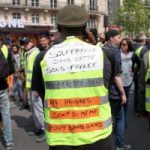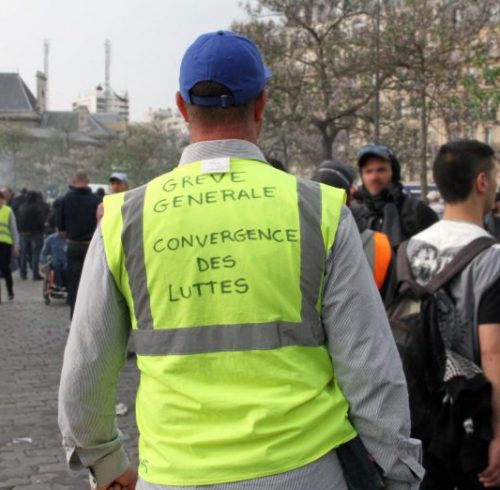A “GREAT NATIONAL DEBATE” TO SUFFOCATE “THE REAL DEBATE”. When in the last part of 2018 the Gilets jaunes reaffirmed their intention to continue their movement, Emmanuel Macron announced a “Great National Debate” to start in 2019 and to last 3 months. The aim was not to listen to the wishes of the citizens and respond with certain measures. It was to block the social movement, and with a deal of glitter, retake control of the narrative presently dominated over the country by an enormous and challenging wave of protests.
The great national debate was set around four thematic axes: Taxation and Public expenditure, State organisation and Public Services, Democracy and Citizenship and Ecological Transition. Participants on a particular on-line questionnaire were asked
On a dedicated on-line site, participants accessed kits of multiple-choice questions to answer. The Ecological Transition theme posed 17 questions for instance, mostly focused on individual behaviour: what can make people use public transport or save on energy and heating. This ‘great debate’ itself engendered the need for an enormous machinery, for all the data to be entered, processed and then returned.
The French public did not confine itself to the four axes. It got hold of all the means available, local meetings, citizens’ communal ‘cahiers’ and the internet. It used these not only to oppose the government’s liberal policies, but to propose particular steps to tackle social inequality. To the four obligatory axes of debate, they added the themes of Health, Social Justice, Purchasing Power, Jobs and Education.
In January 2019, the Gilets jaunes created their own on-line consultation: “The True Debate”. They did this from their completely different angle of participative democracy. After having selected their concerns to include those they always had from the start of their movement, they gave to the voters the following choice: ‘for’, ‘against’ or ‘mixed view’. As more than one million people took part, what the Gilets jaunes want and do not want has become clear. The researchers of theCentre National de Recherche Scientifique(CNRS) who sorted out the results identified four major centres of concern. These indicated the need for profound transformations in the political system and in the provision of the public services. Longing for social and fiscal justice came out of this, along with a very keen realisation of the ecological and climatic emergency. There was a search for another and more egalitarian system of education, same rights for all, the end of repression, the right to dignified dying.
The results of this [True Debate] showed how the movement uses the reasoned argument to overcome the preconceived ideas gushing from the media. The latter tries to find similarities in the ‘true debate’ between the ideas of the movement and those of the extreme-right: return to the death penalty, zero immigration, down with Europe, etc.
In the ‘Great National Debate’, the themes of ecological transitionand taxation & public expenditure topped the concerns, and the answers went well beyond the questions that had been asked.

Ecological Transition
In the answers on this topic, the proposals sought collective answers to protect the natural resources, agricultural development, biodiversity, bio-production, recycling, the speedy introduction of alternatives for sustainable and renewable sources of energy, the banning of pesticides, taxes on the big polluters, etc. Where these matters were addressed by ‘The True Debate’, it added ideas on improved public services, better public transport systems, the lorry lorry-loads go on trains. The idea of the renationalisation of the motorways followed on the original demand of the Gilets jaunes to finish with the motorway tolls. They used to insist on the free collection of rubbish and the free supply of water, gas, electricity and water. Now they speak against the privatisations, new or on-going, of airports, hydro-dams, etc. The State must control big pharma, and in the field of agriculture, bio and short circuits must prevail. Ban the glyphosates (herbicides for instance) and slap taxes on intensive farming.
On this theme, the strong aspiration was revealed to preserve the environment presented as “common good for the whole of humanity”. Stop immediately the “Montagne d’Or” gold-mining project in [French] Guiana. Stop building nuclear power stations. Don’t send your radioactive waste in space. Stop drilling to exploit the shale gas.
Taxation and Public Expenditure
The majority of those who took part in this debate pronounced in favour of less charges and taxes: Fiscal justice to mean high charges on capital gain and big incomes; a return to taxing wealth and property; a struggle against fraud and fiscal evasion; lower taxes for the citizens and pensioners through VAT on basic goods. In the field of public expenditure, it was felt essential that the State should tone down the opulence, and also make cuts in the defence budgets. The way taxes are collected and used must be made explicit and transparent.
In ‘The Real Debate’, these positions were much clearer. The focus was on social and fiscal justice: “Let the big pay big” was the notion; no clemency to be shown to those who salt their money away in fiscal paradises.
There is a strong demand in this field where the fraudsters are not sanctioned and where so much inequality prevails today in the way people are dealt with. “Some people have all the rights”, say those who refer to the Alexandre Benalla’s incident (see reference No 3 at the end), “and others have no rights at all” they say, in reference to the repression of the Gilets jaunes.
A reorganisation of the field of public expenditure is necessary, along with the status of the private banks responsible for the public debt, because these need to be nationalised.
The idea of reintroducing the ISF (‘solidarity wealth tax’) is considered both a just demand and the way to pay for the social needs that improve the conditions of life.
There were demands for the wages and pensions to rise with inflation, and the same for the minimum wage, the pensions and the basic social supports. The CICE must go (a tax break on companies for them to create jobs); it may not be removed from the small enterprises, but those who have not created jobs must give back the money. In a general way, all the fiscal niches must be revised and reviewed.
Public Services and the Organisation of the State
It is on these matters and the answers they received that you see the perversity of the original questions. These were posed to make people agree with the reforms that this government is trying to impose: Are there too many or too few administrative layers? Do the local functionaries need more autonomy? Can you access the public services ok? Did you know about your ‘right to err’, i.e. to make mistakes when dealing with officials and bureaucracy? … In spite of all this however, access to the public services remains gruelling for many. Access to health must be improved in the rural areas where many hospitals have been closed with not enough GPs and health centres left.
The need is for public transports more adapted to the daily needs of people and with the right timetables.
In a general way, a qualitative improvement is needed in the public services to respond to the needs, and to put the human aspect at the core of it all.
In relation to the organisation of the State, people expressed high levels of suspicion towards the upper echelons of the public service and the privileges that are enjoyed there.
In ‘The Real Debate’, and beyond the proposals for re-nationalisations already raised in “Ecological Transition”, the Gilets jaunes raised similar ideas. They too want proximity and equal access to the public services, particularly in the fields of health, education, infrastructures and transports. They added to this their strong rejection of the growing disengagement of the State. and the steady replacement of the professional functionaries by untrained contractors. The coming reform regarding this is known as CAP22.
Democracy and Citizenship
On this subject, the preoccupation was great to get perks and privileges stopped for those whom we elect, the present ones and the past ones. There were doubts about exemplarity in this field, and the way mandates are served. The need was strongly felt to raise the level of citizen participation in the public decisions. In ‘The Real Debate’, the feeling was that a greater role must be played in society by the Trade Unions and the citizens’ associations.
The ‘referendum d’initiative populaire’, or RIC, is the idea that the citizenry should be able to abrogate laws, revoke politicians and make certain constitutional changes. This led to questions as whether to upgrade the present system of representative democracy, or help with the formation of a new democratic model based on a struggle against the lobbies, the protection of whistle-blowers and insistence on a clean criminal record for anyone standing in elections.
The Real Debate’ wondered if the results of an election should not be annulled when the majority of bulletins turn out to be blank or spoilt. There were ideas to end parliamentary immunity and to place the citizens at the centre of all political reforms.
As a general rule, the Gilets jaunes reject the electoral practices that lead to no true choice. For them, abstention does not show a lack of interest but the refusal to surrender to injustice. They do not necessarily oppose those who are elected, but they reject the false meritocracy. To make it effective in guaranteeing the general interest, the political system must be seriously revised. As they see it, the Gilets jaunes cannot be a political movement because this would submit the latter to compromises vis-à-vis the system.


















